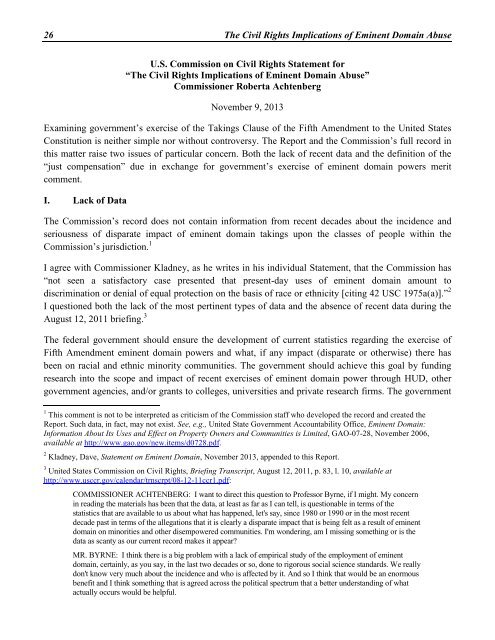Create successful ePaper yourself
Turn your PDF publications into a flip-book with our unique Google optimized e-Paper software.
26 The Civil Rights Implications of <strong>Eminent</strong> <strong>Domain</strong> AbuseU.S. Commission on Civil Rights Statement for“The Civil Rights Implications of <strong>Eminent</strong> <strong>Domain</strong> Abuse”Commissioner Roberta AchtenbergNovember 9, 2013Examining government’s exercise of the Takings Clause of the Fifth Amendment to the United StatesConstitution is neither simple nor without controversy. The <strong>Report</strong> and the Commission’s full record inthis matter raise two issues of particular concern. Both the lack of recent data and the definition of the“just compensation” due in exchange for government’s exercise of eminent domain powers meritcomment.I. Lack of DataThe Commission’s record does not contain information from recent decades about the incidence andseriousness of disparate impact of eminent domain takings upon the classes of people within theCommission’s jurisdiction. 1I agree with Commissioner Kladney, as he writes in his individual Statement, that the Commission has“not seen a satisfactory case presented that present-day uses of eminent domain amount todiscrimination or denial of equal protection on the basis of race or ethnicity [citing 42 USC 1975a(a)].” 2I questioned both the lack of the most pertinent types of data and the absence of recent data during theAugust 12, 2011 briefing. 3The federal government should ensure the development of current statistics regarding the exercise ofFifth Amendment eminent domain powers and what, if any impact (disparate or otherwise) there hasbeen on racial and ethnic minority communities. The government should achieve this goal by fundingresearch into the scope and impact of recent exercises of eminent domain power through HUD, othergovernment agencies, and/or grants to colleges, universities and private research firms. The government1 This comment is not to be interpreted as criticism of the Commission staff who developed the record and created the<strong>Report</strong>. Such data, in fact, may not exist. See, e.g., United State Government Accountability Office, <strong>Eminent</strong> <strong>Domain</strong>:Information About Its Uses and Effect on Property Owners and Communities is Limited, GAO-07-28, November 2006,available at http://www.gao.gov/new.items/d0728.pdf.2 Kladney, Dave, Statement on <strong>Eminent</strong> <strong>Domain</strong>, November 2013, appended to this <strong>Report</strong>.3 United States Commission on Civil Rights, Briefing Transcript, August 12, 2011, p. 83, l. 10, available athttp://www.usccr.gov/calendar/trnscrpt/08-12-11ccr1.pdf:COMMISSIONER ACHTENBERG: I want to direct this question to Professor Byrne, if I might. My concernin reading the materials has been that the data, at least as far as I can tell, is questionable in terms of thestatistics that are available to us about what has happened, let's say, since 1980 or 1990 or in the most recentdecade past in terms of the allegations that it is clearly a disparate impact that is being felt as a result of eminentdomain on minorities and other disempowered communities. I'm wondering, am I missing something or is thedata as scanty as our current record makes it appear?MR. BYRNE: I think there is a big problem with a lack of empirical study of the employment of eminentdomain, certainly, as you say, in the last two decades or so, done to rigorous social science standards. We reallydon't know very much about the incidence and who is affected by it. And so I think that would be an enormousbenefit and I think something that is agreed across the political spectrum that a better understanding of whatactually occurs would be helpful.


